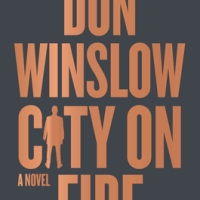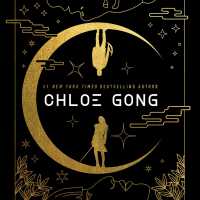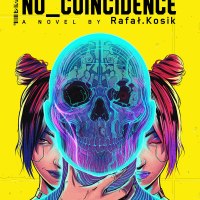Book Review: The Consuming Fire by John Scalzi
I received a review copy from the publisher. This does not affect the contents of my review and all opinions are my own.
The Consuming Fire by John Scalzi
Mogsy’s Rating: 3 of 5 stars
Genre: Science Fiction
Series: Book 2 of The Interdependency
Publisher: Tor Book (October 16, 2018)
Length: 336 pages
Author Information: Website | Twitter
In my review of The Collapsing Empire, I wrote that while it marked a strong return for John Scalzi to the realm of space opera, ultimately it is the next book that will determine whether The Interdependency series will sink or swim. So now that I’ve read the sequel, what did I think? Well, I’ll be honest—I was hot and cold on it. There were moments where I felt the novel floundered, but others where things really soared to new heights. I’m going to say that, for the time being, we seem to be in a holding pattern.
The Consuming Fire picks up where the previous book left off, with the future of humanity cast in doubt as it is revealed that the extra-dimensional conduit known as the Flow—our species’ primary mode of travel between the stars, and the only system linking human colonies across the galaxy—is on the verge of collapse. Once it goes down, billions will be cut off and left to die, leading to the complete destruction of the Interdependency, the network of human hubs making up the interstellar empire.
The Emperox Grayland II, formerly Cardenia Wu-Patrick, is trying her best to prepare for the coming disaster, but unfortunately, distractions caused by bitter infighting with the other noble houses aren’t helping. House Nohamapetan, longtime rivals of the Wus, is up to its old tricks, conspiring with the Emperox’s enemies in the government to try and seize the throne. But Grayland, determined to convey the dire news of what’s happening to the Flow, has some tricks of her own. As head of the Church of the Interdependency, she reveals she has been having religious visions, styling herself after the first Emperox who was famously known to have been something of a prophet.
I feel so conflicted about this book. On the one hand, the world-building is compelling, and the majority of the characters are interesting to follow, but there were also times where I found myself almost dying of boredom, which is not something I thought I would ever say about a Scalzi novel. I love his work. I always have. But a knot of dread had been forming in my belly ever since I read in an interview that his Interdependency series would be paralleling the climate change debate, and I worry that my fears have come to pass. As a general rule, I could care less what an author’s political and social leanings are, as long as they can write and tell a good story, and above all keep the blatant preachiness about real-world issues out of their books. Speaking as someone who reads SFF for the escapism, it’s always disheartening to watch a novel all but become a thinly veiled opportunity for an author to stand on their soapbox. While I’m no stranger to message fiction, things tend to get dicey whenever ideas are elevated above story elements, such as plot and characters.
Some of which I suspect was happening here, because things certainly felt a little…off. Characters, which are normally Scalzi’s forte, unexpectedly came across as flat and uninspired. A couple of them have been transformed into instruments of polemic, where their dialogue feels forced and scripted, almost in a grandiose and melodramatic “now, how do I turn this into a mic drop moment?” kind of way. Kudos to Scalzi for also trying his hand at something more cerebral, but his mistake might have been to force his usual snark onto this series, which reveals he has only one mode of humor. Nothing wrong with that on the surface—heck, some of the books that have made me laugh the hardest have been Scalzi’s. But again, it didn’t seem to work as well here. It felt like every time the moment called for some comic relief, inevitably it would involve Kiva Lagos walking in dropping a few F-bombs, because haha, that’s one sure fire way to get a laugh, right? Apart from Cardenia/Grayland, who has become almost as unmemorable as Marce, Kiva’s character was perhaps the biggest letdown in this sequel.
Still, credit where credit’s due, when the story gets good, it gets amazing. It’s probably no surprise that my favorite sections were all related to the parts about government conspiracies, assassination attempts, jailbreaks, and old Countess Nohamapetan being up to her usual wicked self. There was also plenty of intrigue as our characters are faced with significant questions following a meeting with an isolated remnant of a previously cut-off population, and I think this thread can lead to some consequential developments.
All told, The Consuming Fire suffers from an obvious agenda and a little of second-book syndrome, but I love John Scalzi too much to be writing The Interdependency off just yet. Everything now rests on the shoulders of the next book, which I hope will step up the storytelling and the character development, because in the end, those elements will be the key to this series’ success.
![]()
![]()
More on The BiblioSanctum:
Review of The Collapsing Empire (Book 1)













Good review! Haven’t started this series yet but this only increased my doubt
LikeLike
I hope you give it a shot! The first book was fun…this book was too, mostly. But I also fear it’s taking the series in the wrong direction.
LikeLike
Great review. I’ve been looking forward to this one and was hoping it was good. I do have some concerns about the climate change parallels, which on the one hand I think is laudable, to raise awareness, but at the same time I’m with you- I read SF for escapism primarily. I don’t want TOO much relevance haha. Also it sounds like Cardenia as well as Kiva were a little lackluster here, which is a shame. I’ll definitely go into this one with my expectations modest.
LikeLike
I think it’s fine for him to want to raise awareness, but a part of me also thinks that’s what his blog and social media are for. His fiction should be about telling stories. I would prefer if politics stayed out of my entertainment, we get inundated enough with it in all other aspects of our life 😀
LikeLiked by 1 person
I kinda skimmed half your review cuz i haven’t read this, and want to avoid anything vaguely spoiler like.
The first book of this series was my fave read last year and i’m looking forward to reading this ❤
LikeLike
I hope it works for you! 😀
LikeLiked by 1 person
I was confused because when I got the email notification for your post, the rating said “4 stars.” And I got very excited! I’ve actually read other reviews similar to yours, and I’m a little bummed. I’ll be reading this for SciFi Month, and I am relieved that it’s short😉
LikeLike
Yeah, I messed up the rating on my first run, the perils of copying and pasting without double checking! 😀
LikeLike
I’m with you on being annoyed by most preachy fiction…regardless of whether or not I agree with the author’s point of view. I make occasional exceptions if the author is primarily a philosopher who has the skill to explore their views through fiction and still tell a good story (e.g. C. S. Lewis), but a J. R. R. Tolkien approach where he acknowledges that his worldview affects his writing but does not generally go out of his way to moralize works way better for me.
LikeLiked by 1 person
Yeah, preachy fiction is plain annoying, no matter the subject or the point of view. I’m disappointed that a veteran author like Scalzi doesn’t understand that, or maybe he just feels that he’s big enough now and can get away with it. It’s a huge turn off either way.
I also agree with you that “philosopher authors” sometimes get a pass since that is the whole point of their work, but yeah, Scalzi is so obviously is not one of them. And yes, it still needs to be a good story!
LikeLiked by 1 person
Completely agree.
LikeLike
Thanks. When I read your review, it was also very validating and a relief to know I wasn’t the only one who felt that way!
LikeLiked by 1 person
I’m two-thirds along with this one, and I have to echo your misgivings: while the plots-within-plots are underway, the story moves along at a great pace, and I’m enjoying the segment about the (re)discovery of lost Dalasysla, but at other times it does not even look as if I’m reading a Scalzi novel, because usually his style is all but pedantic.
Let’s hope that this is just a manifestation of the “middle-book syndrome” and that we’ll enjoy something better with the next one…
LikeLike
I couldn’t agree more! There were literally parts where I scratched my head and thought to myself, “This doesn’t even feel like Scalzi!” I also thought the writing was on the pedantic side, and it’s especially noticeable in the dialogue. It just felt so forced.
LikeLike
Dying of boredom!? Ha, no thank you
LikeLike
It wasn’t like him at all. Sigh
LikeLike
Great review! I have been thinking about starting this series because I’ve been looking for more space opera.
LikeLike
I love his Old Man’s War series, you should consider that as well! 😀 And as a bonus, no preachiness 😀
LikeLiked by 1 person
Hah! I’ll think about it. Honestly not sure where to start with the rest of his stuff as I’ve only read Lock In and Head On.
LikeLike
Poomp. I was hoping this would be better. I think I’ll still try and pick up but it doesn’t make me feel like racing to do so which is a shame because I really enjoyed the first.
Lynn 😀
LikeLike
I kinda feel the same right now about the next book. I mean, I hope the series will look up again, but I might not be racing to tackle it either.
LikeLike
Pingback: Mogsy’s Bookshelf Roundup: Stacking the Shelves & Recent Reads | The BiblioSanctum
I liked the first book, and I hope the second will be not too much disapointing…
LikeLike
Crossing my fingers you’ll enjoy it!
LikeLiked by 1 person
Ive read The consuming Fire and really enjoyed it I didnt find the parallels with Global warming belaboured I think maybe readers have said to Scalzi that Flow Denial is like Global Warming Denial but thats about the only parallel I thought the humour was great including Kivas F bombs . I’m not sure what you mean by Scalzi taking the series in the@ wrong direction ‘as revelations in the book explain Earths absence I was never bored while reading the novel
LikeLike
https://www.theverge.com/2018/2/12/16992910/john-scalzi-the-consuming-fire-collapsing-empire-cover-reveal-q-and-a
Glad you enjoyed it. But please recognize and respect that others will have their own opinions.
LikeLike
Pingback: Les Flammes de l’Empire – John Scalzi – Albédo
Pingback: Audiobook Review: The Last Emperox by John Scalzi | The BiblioSanctum